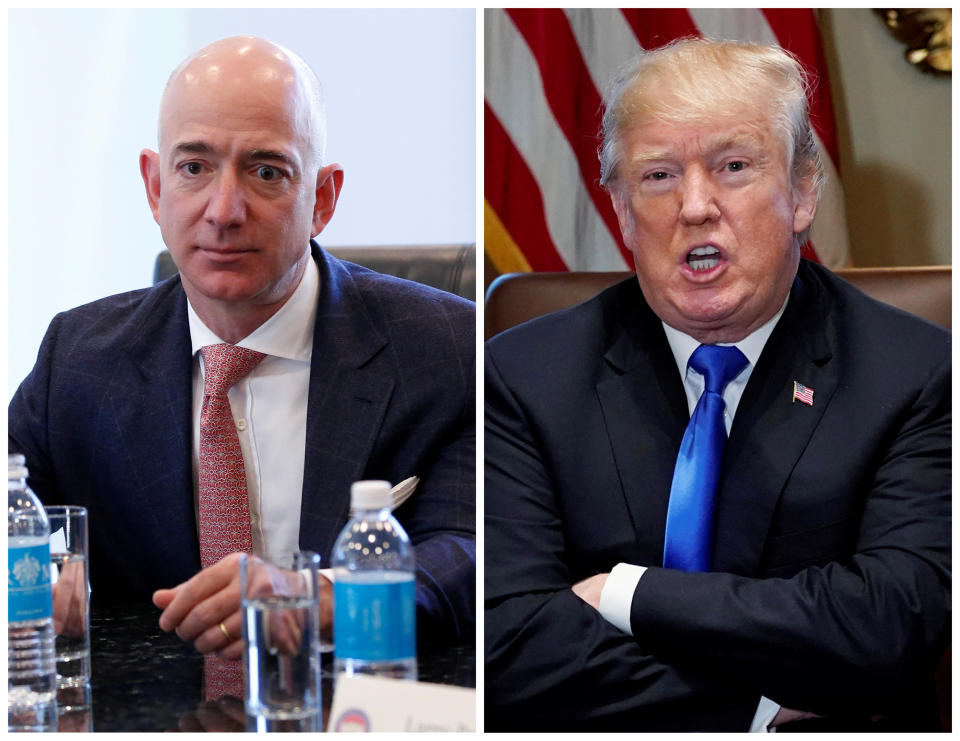Sheila Bair: Trump is going after the Bill of Rights
On Friday, the Trump slump turned into a Trump dump as rampant selling took the stock market into a second correction. To be sure, most of the decline was driven by a weak jobs report and fears of a trade war. But Amazon (AMZN), third largest weighted stock in the widely-held S&P 500 (^GSPC), had a different problem.
Amazon has been the victim of a series of drive-by tweets from the president of the United States, aka POTUS, taking its stock down by 3.0% since the presidential barrage started on March 29. (This compares to the more modest 1.4% decline in the S&P 500 during the same period.) In the process, Trump has wiped out $21 billion of shareholder value for the millions of Americans (including me) who own Amazon, either directly or indirectly through index investing.
This would not be the first time a U.S. president trained his ire on a particular company for political purposes. What makes this situation so pernicious are numerous reports, which Trump’s hot-blooded haikus seem to confirm, that the attacks are motivated by his anger over negative coverage by the Washington Post. The Post is owned by Amazon founder, Jeff Bezos, not the company, but that fact doesn’t seem to get in the way of Trump’s apparent determination to take value from Amazon shareholders in retribution for the Post’s reporting.
Democrats— and much of the “liberal” media Trump frequently attacks— continue to obsess over clumsy Russian efforts to interfere with our elections as the challenge of our times to American democracy. But they could pay more attention to this ongoing assault on two of our most precious rights, enshrined in the Constitution and fundamental to the functioning of any free Republic: the First Amendment’s guarantee of freedom of expression and the Fifth Amendment’s protections against government taking of private property without due process of law.
John Locke, the 17th-century English philosopher whose writings informed the foundation of modern democracies, believed property ownership to be one of the three natural human rights. Benjamin Franklin called freedom of speech a principal pillar of free government. But you do not have to be a philosopher or historian to understand why free speech and property rights are fundamental to a functioning democracy. Deprivations of private property have been the weapon of choice for suppressing freedom by many a dictator: witness the Fascist’s wholesale appropriation of property owned by Jews and other disfavored groups in the lead-up to World War II. Dictators also suppress freedom of speech as a way of controlling the population, so, as George Washington put it, “Dumb and silent we may be led, like sheep to the slaughter.”

Is Trump a modern-day Mussolini, as Larry Summer’s recently suggested? No, I don’t think this is an intentional attempt to pare back the Bill of Rights. More likely, it is a poorly-reasoned, emotional outburst against a newspaper which is hurting his feelings. Ironically, since we are still (at least for now) a nation of laws, those outbursts are counterproductive to Trump’s stated goals of changing policies which he says unfairly benefit companies like Amazon. He has complained about our taxation system as it applies to e-commerce and postal rates applicable to bulk shippers. Though his arguments have been challenged, they are legitimate for discussion.
But now, should Trump’s administration move on these, or any other area adversely impacting Amazon, it may well be challenged for political motivations and compromise of free speech. Indeed, the Justice Department had to defend against such arguments in its litigation to block AT&T’s (T) attempted acquisition of Time Warner (TWX). AT&T’s attorneys initially argued that Trump’s tweet tantrums against CNN (owned by Time Warner) were a motivation behind DOJ’s suit, even though this case has been long in the making and is reportedly driven by career DOJ antitrust attorneys, not the White House.
Former Kansas senator and GOP presidential nominee, Bob Dole, a consistent and faithful Trump supporter, once publicly advised Trump to talk about policies, not people. The same advice could be given for corporations. Instead of ad hominem, or in this case ad corporis, attacks on specific companies, Trump would be better served by challenging policies he believes are unfair. His attack on Amazon provides yet another example where he may have valid policy arguments, but undercuts them by turning what should be a reasoned debate into a schoolyard brawl.
Similarly, Trump may have a point on the liberal bias of some media, but he suppresses the effectiveness of his own speech by using the power of his office to cause financial harm to media companies, instead of documenting and calling out instances of anti-conservative slant. He should heed the words of another famous Kansan, celebrated columnist William Allen White, who once acknowledged there could be folly in free expression, but, “If there is freedom, folly will die of its own poison, and the wisdom will survive.”
Sheila Bair is the former Chair of the FDIC and has held senior appointments in both Republican and Democrat Administrations . She currently serves as a board member or advisor to a several companies and is a founding board member of the Volcker Alliance, a nonprofit established to rebuild trust in government.